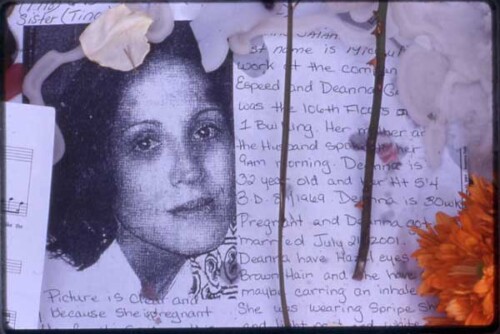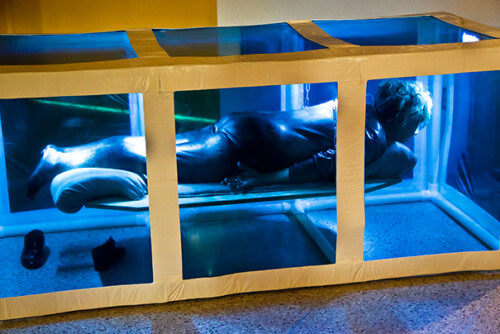When I had finished a draft of this essay, I sent a copy to Wayne Koestenbaum, to be sure that my memory of his words seemed accurate to him. As a result we began an e-mail exchange, which I reprint here because his responses about teaching are an eloquent indication of the kind of teacher he is, but also because his insights about teaching seem applicable in many of our classrooms. (The references to Wayne’s reading refer to a panel I moderated at the Graduate Center, titled “Undisciplined Criticism.”) -Jason Tougaw
***
Hi Wayne. I’m quoting you in an essay I’m publishing, in The Scholar and the Feminist (an new online journal at Barnard) – a special issue on “Public Sentiments” (edited by Ann Cvetkovich and Ann Pellegrini). Keep in mind that it’s a draft. I wanted to be sure my memories of the class rang more or less true for you. Let me know if you have trouble opening it and I’ll put a copy in the mail.
Jason
***
hi Jason.
I enjoyed your piece, and am obviously moved by your evocation of that long-ago classroom.
A few thoughts.
The disavowal of ‘expertise.’ I consider such a disavowal to be a necessary gesture in an interdisciplinary or post-disciplinary classroom; and also necessary in any course that, like the ‘poetics of the letter,’ does not privilege “field specialty” but a broader poetic project of learning how to read in order to learn how to write. In other words, the expertise I was disavowing was not an expertise in reading or writing; in fact, I don’t imagine I ever made any gesture toward disavowing that I felt myself to be an “expert” reader and writer, an expert connoisseur of textual nuance, and of the psychodynamics of the reader/text relation. It’s interesting that you heard my disavowal as a larger one than I’d meant it to be – also that the disavowal resonated so deeply with you, since, for me, it was a rather casual, necessary, preliminary gesture, to clear the air before we got down to the business of serious reading.
I remember thinking that you seemed quite distant and guarded, in the classroom; suspicious? Not quite “at home.” As if you were surprised to find yourself in this classroom, not sure it was the place for you. That reticence, I recall, puzzled me. It didn’t perturb me, in the least. And I might be misremembering it. I chalked your reserve up to the often weird dynamic between gay male teacher and gay male student: the assumption that somehow it should be “different” (warmer? easier?) than between straight male teacher and gay male student, and the surprise that it is often just the same.
My memory of that class is tempered by the fact that I had already taught that same course already, a couple of years earlier, to undergraduates; and so I had a slightly bittersweet sense of retrospect, of re-enactment: As if to say, this is the second time I am reading Keats’s letters with students. And it is not the same experience as the first time. A small part of me was therefore not present in the room with the current CUNY course but a few years back in time in the other classroom. Two superimposed classrooms.
I guess the most important thing always to me in my teaching is that I can only honestly present myself to students as someone who has internalized language, who has crafted (through his own writing practice) his own individual relation to the body of language; and that my job in the classroom is to demonstrate as honestly as possible my relation to language’s body. What perhaps allows me to “disavow,” in such a cavalier way, traditional academic “expertise,” is that I have confidence in my primary relation to language, in that relation’s rigor and self-consciousness. So what I “profess” in the classroom is simply that: a committed regard for words and their history and their power. I strongly feel that that is an important thing to pass on to students, to show as a possibility, an attainment, a practice and process – much more meaningful to me, in the long run, than the specific “knowledge” of a field, a knowledge that can too easily be divorced from language’s nourishing (and, I daresay, prior) ground.
Hope these reflections help.
With gratitude –
Wayne
***
This helps a lot, actually. It helps me see that I haven’t been quite clear enough. I meant to explain the disavowal in exactly the terms you do here – that you disavowed expertise for good, productive reasons, emphasizing expert reading and writing instead. The latter is so much more interesting and valuable. I didn’t actually hear your disavowal as a larger one, but I was trying to cast myself, retrospectively, as an unreliable narrator. I’m going to have to look at those details and make that clearer.
What you read as my guardedness was really just my anxiety – mainly about the fact that I felt I had to get serious and figure out how to succeed in the academic world, on what I thought were its terms. I’m over this now, but it was a big deal for me then. I was freaking out about it. And, actually, there was something weird going on with the fact that when I chose to go to CUNY, it was partly because it advertised itself as a place where lots of lesbian and gay work was happening. This turned out not to be true, at least not in English. If you had been there earlier, I’m sure I would have wanted to work with you. But that turns out not to have been fate.
Your last paragraph here – where you describe your teaching – is so eloquent. And very familiar. It’s what I try to do also: present my relationship to the material as honestly as I can and encourage students to craft theirs. Princeton students are fixated on knowledge, as a sign of status. I probably was too when I took your course.
Anyway, thanks.
Jason
***
hi Jason –
Thanks for your warm and eloquent clarifications. I’m grateful for your clarity and intellectual resourcefulness.
With best wishes,
Wayne


